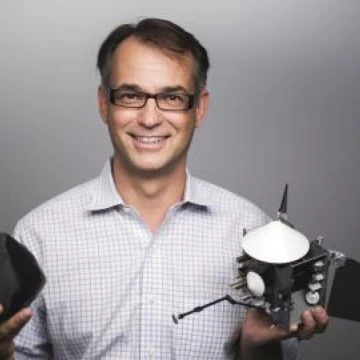New Scholarship Dedicated to Students Double Majoring in Humanities and Science


It’s easy to see how Dante Lauretta’s undergraduate degrees in physics and theoretical math are foundational in his career as a planetary scientist.
But Lauretta gives just as much credit to his third major, Japanese, describing his study of language and culture as a challenge that helped him focus his curiosity on fundamental questions of existence and his drive to create knowledge for the human race.
“Scientists are creative and they are curious. I believe art and science are different facets of the same human drive,” he says. “They both reach down into those core questions that drive every one of us: Where did we come from? Are we alone in the universe? Why are we here?”
After receiving the College of Humanities Alumnus of the Year award in 2017, Lauretta and his wife M. Katherine Crombie, also a space scientist, decided to work with the college to create a scholarship to encourage and support students whose own studies bridge the sciences and the humanities.
The Dante S. Lauretta and M. Katherine Crombie Award is the first interdisciplinary scholarship of its kind at the University of Arizona. Applicants must have declared either a major or minor in both the College of Humanities and the College of Science. Full-time juniors, seniors or graduate students are eligible.
“As a student the University of Arizona, I had these two different paths that I was studying. I was studying math and physics and science and then I was also really interested in Japanese history, language and culture,” Lauretta says. “I never dreamed that they would actually come together and merge into a coherent career track, but amazingly after getting involved in an asteroid mission, a team in Japan was developing the same ideas and trying to answer the same fundamental questions. So it required me to take advantage of my humanities education in approaching our Japanese colleagues.”
Lauretta is principal investigator of the OSIRIS-REx asteroid sample return mission and UA Professor of Planetary Science and Cosmochemistry. Crombie is the Lead Archive Scientist for the mission, a position she’s held on other space projects. They met as doctoral students at Washington University in St. Louis.
“My career has benefited greatly by having duel majors in communications and geology. Dante and I are pleased to be able to provide support for students looking to make contributions at the intersection of science and the humanities,” Crombie says. “The intersections are where the truly innovative ideas come from.”
College of Humanities Dean Alain-Philippe Durand says the technological changes brought on by the Fourth Industrial Revolution will create new opportunities for students who have a solid education in both the sciences and humanities.
“The questions surrounding the relationship between technology and human nature will only grow more complex and the expertise provided by the humanities will be essential in addressing the grand challenges of the next century,” Durand says. “Dante Lauretta thoroughly understands how scientists can benefit from a humanities education and his work can inspire students today and in the future to pursue that connection themselves.”
College of Science Dean Joaquin Ruiz says the scholarship will encourage students from both the sciences and humanities to expand their educations as well as future career options.
“There is no doubt that a broad education gives you the imagination to address all kinds of issues with a broader view of possible solutions,” Ruiz says. “Dante is the perfect example of why diversity is so important in higher education. An understanding of the deep thoughts of humanities can certainly inform scientific enquiry.”
Indeed, in his own work as a professor, Lauretta emphasizes the need for a broad set of skills, including the communication, adaptation and problem-solving skills delivered by the humanities.
“I get the chance to mentor a lot of undergraduate students and the number one piece of advice that I always give them is make sure you have opportunities when you graduate,” he says. “You want to be diverse and you want to have a lot of skills and you want to be able to explore a little bit and have a couple options in front of you.”
Scholarship applicants must have financial need, a minimum 3.0 GPA, making satisfactory progress toward their degree, and enrolled in coursework in the College of Humanities and the College of Science. Preference is given to the student(s) who can demonstrate their participation or volunteer experience with the Boys and Girls Club or a similar youth organization.
A live and silent auction in connection with Bennuval raised $7,300 for the scholarship and Lauretta and Crombie have committed to growing that gift to $25,000 to endow the scholarship and support students in perpetuity.

